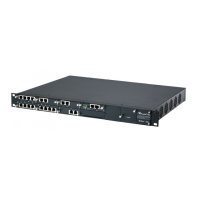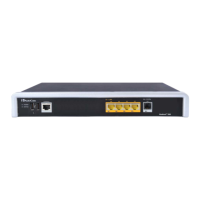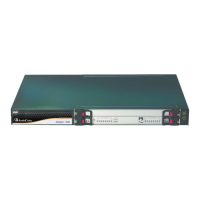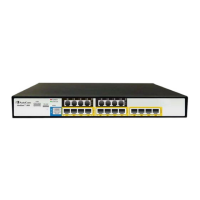User's Manual 508 Document #: LTRT-89730
Mediant 3000
Parameter Description
ss]
10.8.8.5) or as an FQDN. By default, no value is defined.
Notes:
If the address is an FQDN, DNS resolution is done according to the
DNSQueryType parameter.
The source IP address is obtained from the Contact header in the
INVITE message.
You can configure from where the source IP address is obtained, using
the SourceIPAddressInput parameter.
The source IP address can include the following wildcards:
"x": denotes single digits. For example, 10.8.8.xx represents all the
addresses between 10.8.8.10 and 10.8.8.99.
"*": denotes any number between 0 and 255. For example,
10.8.8.* represents all addresses between 10.8.8.0 and
Source Phone Prefix
[PstnPrefix_SourcePrefix
]
Defines the prefix or suffix of the calling (source) telephone number.
The prefix can include up to 49 digits. You can use special notations for
denoting the prefix. For example, [100-199](100,101,105) denotes a
number that starts with 100 to 199 and ends with 100, 101 or 105. To
denote any prefix, use the asterisk (*) symbol. To denote calls without a
calling number, use the $ sign. For a description of available notations,
see ''Dialing Plan Notation for Routing and Manipulation Tables'' on page
827.
By default, no value is defined.
Note: If the P-Asserted-Identity header is present in the incoming INVITE
message, the value of the parameter is compared to the P-Asserted-
Identity URI host name (and not the From header).
Source Host Prefix
[PstnPrefix_SrcHostPrefi
x]
Defines the prefix of the URI host name in the From header of the
incoming INVITE message.
By default, no value is defined. To denote any prefix, use the asterisk (*)
wildcard.
Note: If the P-Asserted-Identity header is present in the incoming INVITE
message, the value of the parameter is compared to the P-Asserted-
Identity URI host name (and not the From header).
Destination Phone Prefix
[PstnPrefix_DestHostPre
fix]
Defines the prefix or suffix of the called (destined) telephone number. You
can use special notations for denoting the prefix. For example, [100-
199](100,101,105) denotes a number that starts with 100 to 199 and ends
with 100, 101 or 105. To denote any prefix, use the asterisk (*) symbol or
to denote calls without a called number, use the $ sign. For a description
of available notations, see ''Dialing Plan Notation for Routing and
Manipulation Tables'' on page 827.
By default, no value is defined.
The prefix can include up to 49 digits.
Destination Host Prefix
[PstnPrefix_DestPrefix]
Defines the Request-URI host name prefix of the incoming INVITE
message.
By default, no value is defined. To denote any prefix, use the asterisk (*)
wildcard.
Action Tab (Tel Destination)
Destination Type
Defines the type of Tel destination:
[0] Trunk Group (default)
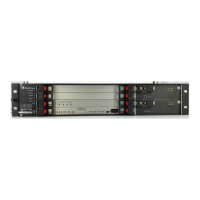
